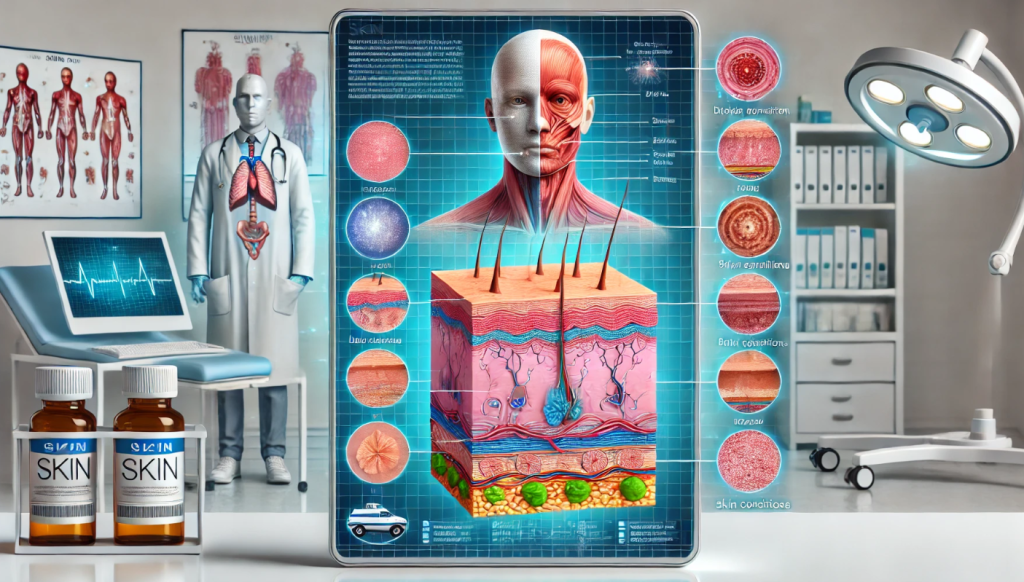Skin diseases encompass a wide range of conditions caused by infections, allergic reactions, genetic factors, or external influences. An appropriate approach to the treatment of skin diseases helps manage symptoms and prevent complications. Let’s explore the main treatment methods.
1. Diagnosis of Skin Diseases
Accurate diagnosis is essential for effective treatment. Key diagnostic methods include:
- Dermatologist examination.
- Blood tests and skin scrapings to identify infections and allergies.
- Dermatoscopy to assess skin lesions.
2. Medications
- Antibiotics: used for bacterial infections like impetigo or folliculitis.
- Antifungal drugs: prescribed for mycoses and candidiasis.
- Corticosteroids: help reduce inflammation and itching in eczema or psoriasis.
- Antihistamines: used for allergic dermatitis.
- Immunomodulators: treat autoimmune skin conditions like vitiligo or lupus.
3. Topical Treatment

- Application of creams and ointments with active ingredients to reduce inflammation, dryness, or itching.
- Use of moisturizers to restore the skin barrier.
4. Physiotherapy
- UV Therapy: effective for treating psoriasis and atopic dermatitis.
- Laser Therapy: used for removing lesions and treating acne.
5. Lifestyle Changes
- Avoid allergens if the skin condition is allergy-induced.
- Maintain skin hygiene with gentle, non-irritating products.
- Keep the skin hydrated, especially in colder months.
6. Diet Therapy
- Include foods rich in omega-3 fatty acids, vitamins A, E, and C.
- Avoid foods that may trigger allergic reactions (e.g., nuts, chocolate, or citrus fruits).
7. When to See a Doctor?
- If skin symptoms persist for more than a week.
- If severe inflammation, itching, or pain occurs.
- If ulcers, blisters, or discharge appear.
8. Prevention of Skin Diseases

- Use sunscreen to prevent UV damage.
- Maintain optimal humidity levels indoors.
- Regularly visit a dermatologist for preventive check-ups.
Skin Diseases and Their Treatment
Skin diseases encompass a broad spectrum of conditions that affect the skin, ranging from mild irritations to chronic disorders. The skin, as the body’s largest organ, serves as a barrier against environmental hazards and is crucial for overall health. Understanding the causes, symptoms, and treatment options for various skin conditions is essential for effective management and maintaining skin health.
Skin diseases can be categorized into several types based on their causes and characteristics. Common conditions include infections, inflammatory disorders, genetic diseases, and skin cancers. Infections may be caused by bacteria, viruses, fungi, or parasites. Examples include impetigo, caused by bacteria, or fungal infections like athlete’s foot. Viral infections such as herpes simplex or warts are also common, as are parasitic infestations like scabies.
Inflammatory skin conditions include eczema, psoriasis, and dermatitis, which often result from immune system dysfunction, allergies, or environmental triggers. These conditions can cause itching, redness, scaling, or swelling and may significantly impact quality of life. Genetic disorders like ichthyosis or albinism affect the structure or function of the skin and are typically present from birth. Skin cancer, including melanoma and basal cell carcinoma, arises from abnormal growth of skin cells and is often linked to excessive sun exposure.
The symptoms of skin diseases vary widely depending on the condition. Common signs include redness, itching, rashes, scaling, blistering, or changes in skin color or texture. Chronic conditions like psoriasis or eczema may cause thickened, scaly patches, while infections often present with localized inflammation, pain, or discharge.
Treatment of skin diseases depends on the specific condition, its severity, and underlying causes. Bacterial infections are typically treated with topical or oral antibiotics, while fungal infections require antifungal creams or medications. Viral skin conditions may need antiviral drugs, although many are self-limiting and resolve on their own.
Inflammatory skin diseases often require a multifaceted approach. Topical corticosteroids are commonly used to reduce inflammation and itching, while calcineurin inhibitors or phototherapy may be recommended for more severe cases. For chronic conditions like psoriasis, biologic therapies targeting specific immune pathways have shown significant effectiveness. Moisturizers and emollients are essential for managing dryness and protecting the skin barrier in conditions like eczema.
Genetic skin diseases often require lifelong management. Treatments may include specialized skincare regimens, nutritional support, or genetic counseling. Skin cancers are treated based on the type and stage of the disease, with options including surgical removal, radiation therapy, or targeted drugs.
Preventing skin diseases involves adopting healthy skin care practices and minimizing risk factors. Using sunscreen to protect against harmful UV radiation is vital in reducing the risk of skin cancer. Regularly moisturizing the skin helps prevent dryness and irritation, while maintaining hygiene reduces the risk of infections. Avoiding known allergens and irritants can prevent flare-ups of conditions like eczema or dermatitis.
Early diagnosis and treatment are crucial in managing skin diseases effectively. Consulting a dermatologist for persistent or severe symptoms ensures appropriate care and minimizes complications. Advances in dermatology, including the development of biologic therapies and advanced diagnostic tools, continue to improve outcomes for individuals with skin diseases.
In conclusion, skin diseases encompass a wide range of conditions that can significantly impact physical and emotional well-being. Understanding the causes, symptoms, and treatment options is key to effective management and prevention. With proper care, many skin conditions can be controlled or resolved, contributing to healthier skin and an improved quality of life.
















